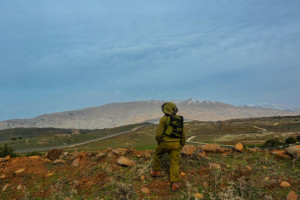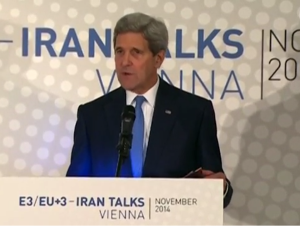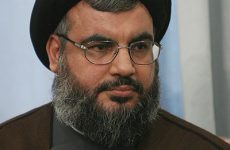
Israel’s dilemma: The Druze community in Syria may soon be targeted for atrocities by ISIL and theother Jihadists that are battling to topple the regime of President Bashar Assad. On the other hand, the Syrian Druze have carried out deadly terror attacks against Israel and stand firmly behind Assad, a bitter enemy of the Jewish state. But across the border in Israel, Druze citizens are loyal citizens of the Jewish state and serve in combat units of the IDF. Despite this unusual state of affairs, the Druze in Israel have close ties with their relatives in Syria and demand that Israel come to the aid of their Syrian brethren. What to do? Israel has succeeded in steering clear of the bloody civil war in Syria that is now entering its fifth year. While she owes a moral obligation to her Druze citizens, should the Jewish state come to the aid of her Druze enemy in Syria?
Through back door channels, Israel has warned ISIL and the other Jihadists, such as al Nusra, to lay off the Syrian Druze communities, or else. In one case, Al Nusra executed 22 Druze men who refused to accept their brand of Islam. However, Al Nusra later apologized for the atrocity saying the perpetrators would be punished. The Israeli warning seems to be working so far. ISIL and the other rebel forces have refrained from attacking the Druze communities.
“The IDF will intervene to prevent the massacre of refugees fleeing to the Israeli border on the Golan Heights.”
More to the point: in a carefully worded statement to the Knesset Foreign Affairs & Defense Committee, IDF Chief of Staff Gadi Eisenkot said:
“The IDF will intervene to prevent the massacre of refugees fleeing to the Israeli border on the Golan Heights.”
He did not refer to the possibility of if the Druze communities, which have their own trained militiamen, came under a sustained ISIL offensive. In such a situation, the Israeli government would face fierce demands from its Druze citizens to go to their aid. Some Druze soldiers in Israel could volunteer to cross the border into Syria to fight as volunteers.
Speaking in the Knesset, Prime Minister Binyamin Netanyahu would only say:
“Israel will not remain indifferent to what happens along her borders.”
“Israel will not remain indifferent to what happens along her borders.”
An initial protest started by the Israeli Druze has subsided, indicating that they, for the moment, are satisfied with what they’ve been hearing publicly and also privately from the Israeli government and the IDF.
Meanwhile, Secretary of State John Kerry’s double talk…

This is what troubles Israel about Secretary Kerry’s conduct of the nuclear negotiations with Iran: In April, Kerry heralded the interim accord that would obligate Iran:
“To implement an agreed set of measures to address the IAEA’s concerns regarding the possible military dimensions of its program in the final agreement.”
Put simply, Tehran would have to come clean on whether it has been trying to develop nuclear weapons. Obviously this is rather pertinent to Israel and Iran’s Sunni Arab enemies, such as Saudi Arabia, the Gulf States and Egypt. But now, on the eve of Kerry’s return to Vienna to finalize the agreement, Kerry has downplayed the possible military dimensions with this statement:
“We are not fixated on Iran specifically accounting for what they did at one point in time or another.”
“We are not fixated on Iran specifically accounting for what they did at one point in time or another.”
In other words, ‘so what if the Iranians have been trying to build A-bombs and lying to this day about it – that’s a minor detail. The important thing is to wrap up the deal’.
Two points: the International Atomic Energy Agency has repeatedly voiced its suspicions that Iran has secretly been developing nuclear weapons. For example, Tehran has refused to supply sufficient answers to twelve key questions. Moreover, Israel has repeatedly declared she has ‘reliable evidence’ that the Iranians have been working on nuclear detonators at the Parchin military base. In the past this claim was dismissed disdainfully by America’s intelligence community. Kerry has even alluded to Israel’s ‘hysteria’ over the nuclear issue. What has changed since April and the end of June? Simply this: Iran’s Supreme Leader Ayatollah Khamenei has rejected a key element of the entire nuclear accord:
“Inspections of military sites and interviews with nuclear scientists will not be allowed.”
“Inspections of military sites and interviews with nuclear scientists will not be allowed.”
Question: just where would the IAEA experts look for nuclear military research if not on nuclear bases? No double talk from Tehran. The IAEA has also insisted that its inspectors be allowed to visit nuclear sites with only two hours notice. Obviously this is required to prevent the Iranians from covering up any illicit work. However, the Iranians also reject this condition. Now the State Department is trying hard to ‘walk back’ Kerry’s latest revelation that actually indicates that Washington is locked on to a nuclear deal on Tehran’s terms.
Iran’s strategy is to keep the way open for resuming its nuclear weapons program when the time is ripe; say, after she has reaped an economic bonanza with the lifting of the sanctions. By that time, Obama and Kerry will be long gone and a new President will have to decide what to do about it. In the interim, Obama may offer increased military aid to Israel and its Arab neighbors to help swallow the bitter pill. The Iranians know a good deal when they see it. My bet is they will offer some palliative that Kerry will jump on.




